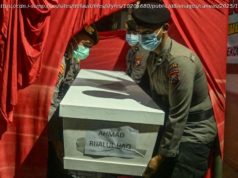War crimes judges ruled Thursday that five children born after their parents were victims of a brutal 2003 attack on a Congolese village were not eligible to receive compensation.
War crimes judges ruled Thursday that five children born after their parents were victims of a brutal 2003 attack on a Congolese village were not eligible to receive compensation.
The International Criminal Court (ICC) judges „dismissed the requests for reparations made by these applicants“ in the case of the convicted warlord Germain Katanga, the tribunal said in a statement.
Katanga, 40, a former militia commander from the restive northeastern Congolese Ituri province, was ordered in March 2017 to pay $1 million in damages to his victims after his forces attacked their village.
He was convicted of supplying weapons to his militia, which went on the rampage, shooting and hacking to death with machetes some 200 people, out of a small close-knit community of about 800 people.
In its first-ever reparations, the ICC awarded a symbolic $250 each to 297 people caught up in the brutal attack by Katanga’s militia on Bogoro village in Ituri province.
It also awarded collective compensation for projects to help victims with housing, education and „income-generating activities“ as well as counselling.
Katanga had sought to appeal the amount of reparations but the sums were upheld in March this year, and the appeals judges also ruled that the claims of five children who had applied to share in the damages should be re-assessed.
Lawyers and rights groups had sought to win compensation for victims of what they called „transgenerational harm“.
But the judges ruled on Thursday that the five children „had not established to the requisite standard of proof the causal nexus between the psychological harm they had personally suffered and the crimes of which Mr Katanga was convicted“.
Katanga is now behind bars in the Democratic Republic of Congo serving a 12-year sentence imposed in 2014 on five charges of war crimes and crimes against humanity for the attack.






